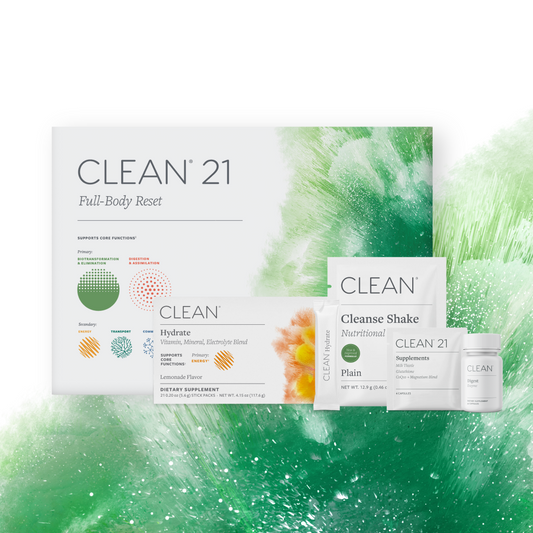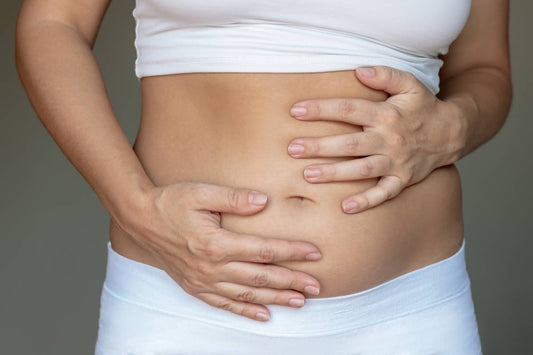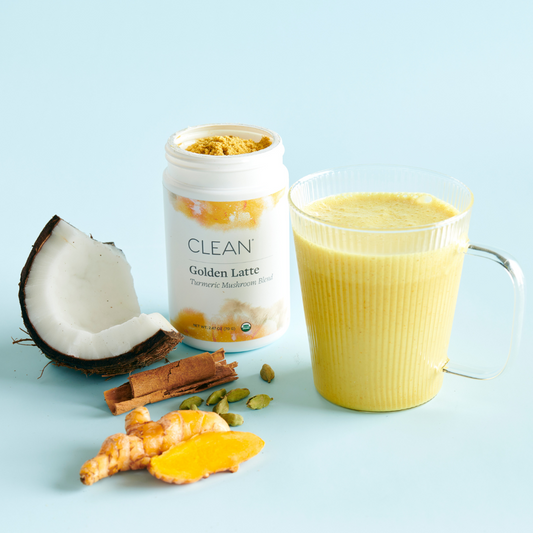
Do Probiotics Help with Bloating? Here’s What You Need to Know
Do probiotics help with bloating?
Yes, probiotics can be a powerful, research-backed solution for bloating and excessive gas problems by addressing their root cause: improper gut microbiome balance. Learn which strains are most effective, how long they take to work, and what to look for when choosing the right probiotic for you.
Main Points:
- Bloating is often caused by uneven balances in your gut’s microbiome, stress, some chronic illnesses, digestion issues, or sluggish digestion.
- Probiotics restore that balance, reduce the gas, and support smoother digestion.
- Look for key strains like Lactobacillus plantarum and Bifidobacterium infantis
- Results take time and typically begin 1-4 weeks after consistent use, with greater relief as time passes
- The right probiotic works with your body, not to mask symptoms but to heal them from the inside out.
You’re just setting down your fork after a delightful meal, perhaps you’re surrounded by friends and family, and as soon as that fork hits the table, you begin to feel it: you feel almost over-full, and you begin to feel like a gurgling, rumbling sensation of gas building. You may already know what this means: You’re bloated.
Bloating is one of the most frequent and frustrating digestive complaints. It can strike anywhere, from the middle of the workday to after a healthy dinner or even first thing in the morning when you wake up—that awful, puffy, painful feeling stuck right under your ribs. Bloating can disrupt your routine, making you feel heavy, sluggish, or nauseated.
Here’s a little interesting fact: bloating is not always about what you’re eating. More often than not, the real culprit is what’s happening inside your magnificent gut microbiome (the ecosystem of microbes that live in your intestines). If the microbiome of bacteria in your digestive tract is out of balance, it can affect everything from digestion to your mental health!
This leads to the next natural question: If your gut biome is unbalanced, do probiotics help with bloating? We’re excited to share, so let’s get right into it!

What Causes Bloating in the First Place?
If you are experiencing bloating ‘suddenly,’ or have been fighting it off and on for a while, it’s likely a significant sign that something deeper is going on within your gut biome. Some of the most typical causes and triggers include:
- Gut bacteria imbalance, also known as dysbiosis.
- High-stress levels which can disrupt digestion.
- Frequent use of antibiotics that indiscriminately kill good and bad bacteria.
- Ultra-processed foods or diets high in sugar can feed bad bacteria.
- Sluggish digestion, digestion issues, or constipation.
All of these factors can lead to excess, painfully, uncomfortable trapped air and fermentation in the gut, which causes that tell-tale overblown balloon feeling in your belly or under your ribs.
Enter: Probiotics, a promising, science-backed solution to the constant, rumbling achiness.
Clean Tip: Support from the Inside Out
If you’re currently stuck in an endless loop of bloating and imbalance, it may be time to give your microbiome the reset it’s asking for. Our Clean Biome Probiotic is doctor-formulated with clinically studied strains like Lactobacillus plantarum and Bifidobacterium infantis, specially chosen to reduce bloating, restore gut flora, and support smoother digestion from the inside out.
So, Do Probiotics Really Help with Bloating?
Yes, probiotics do help with bloating, and there’s a significant growing body of research to prove it! These beneficial bacteria help restore an off-balanced gut microbiome, which plays a critical role in:
- Breaking down the hard-to-digest food particles.
- Reducing inflammation in the digestive tract.
- Preventing excess gas production from fermentation.
- Improving overall digestion rhythm, efficiency, and a healthier gut.
Several clinical studies show the connection between probiotics and significantly reducing abdominal bloating, and a significant improvement for those with IBS or dysbiosis. So, are you still questioning whether probiotics can help with bloating?
The answer is a resounding, scientific-research-backed, yes!
What Probiotic is Best for Bloating?
The best probiotics for gut health and bloating include specific strains that reduce gas, soothe inflammation, and support digestion. The most researched and current renowned strains that target bloating include:
- Lactobacillus plantarum helps reduce gas and abdominal pressure.
- Bifidobacterium infantis is incredibly helpful for IBS-related bloating.
- Saccharomyces boulardii supports digestion post-antibiotics.
When choosing a reputable product for relief, look for:
- Multi-strain blends targeted for digestion
- High CFU counts (but not excessive, as more doesn’t always mean better)
- Shelf-stable, clinically studied formulas
If you struggle to decide which probiotic is best for bloating and gas, or finding one that works for you, look for one designed specifically to support your gut, not general immunity or mood.
How Long Does It Take for Probiotics to Work for Bloating?
That’s a fantastic question, and it’s important to note that probiotics aren’t a magic button to press for instant results (even though we wish they were when we’re in the middle of the worst gas pain).
Your results will vary because your body, lifestyle, diet, health, and how consistently you take them all affect how they will work. Most people generally notice improvements in the first 1-4 weeks, with more noticeable shifts after 6-8 weeks of consistent use.
Expect gradual improvements, and not an overnight fix. Remember: you’re restoring your microbiome, not suppressing symptoms.
Will Probiotics Reduce Belly Bloat, or Does It Just Mask Symptoms?
Unlike traditional temporary fixes like gas relief pills, anti-bloat teas, antacids, or home remedies of peppermint, probiotics work to correct the root cause: gut bacteria imbalance.
When you take them consistently, they will help fight belly bloat by preventing excessive gas, support faster, better digestion, and reduce inflammation that leads to fluid retention.
Probiotics don’t mask symptoms or issues; they’re here to boost you to rebalance your internal ecosystem for long-term relief.
Is There a Downside to Taking Probiotics?
While safe for most people, probiotics aren’t an instant or perfectly flawless solution. As your gut works to readjust with probiotic help, you may experience:
- Continued, mild gas or bloating. It may not be as severe as it was without probiotics, however, your body will need to process and expel that gas (a great first sign your gut’s adjusting!)
- Not every probiotic treatment is backed by scientific research or uses high-quality components. Avoid generic blends with zero strain information.
- Individuals with compromised immune systems or severe illness should always talk to their doctor first.
As with anything, the old adage works here: Too much of a good thing can be bad.
Many other probiotics for bloating may add ingredients, additives, or other probiotics and assume they will be beneficial. Probiotics, like your health and wellness, do not and should not have a one-size-fits-all approach.
Specific probiotics strains should be created that target specific health concerns. Otherwise, you may take a probiotic with a combination that inhibits its effectiveness.
How to Reduce a Bloated Stomach (Beyond Probiotics)
Probiotics are a powerful, excellent tool to have on hand. But it should be considered just one weapon in your wellness armory. Here are some of our favorite holistic practices to follow alongside your probiotic routine to further help reduce future bloating and gas problems:
- Slow down, chew your food a little more slowly to ease and aid digestion.
- Stay hydrated during the day and while you eat, your colon needs that water to help you move waste
- Add and eat naturally probiotic-rich fermented foods to your daily diet.
- Understand and manage your stress with breathwork, meditation, yoga, and mindfulness.
- Support with fiber or digestive system enzymes, like pairing your probiotic journey with the health-packed Clean Gut Program.
If you’ve noted that bloating often comes with constipation, try to seek out the best probiotic for constipation and bloating, with strains like Bifidobacterium lactis and prebiotic fiber.
Trust Your Gut: Bloating Relief Begins with Probiotics
The bottom line is that probiotics do help with bloating, and the key for maximum effectiveness is choosing the right strains, staying consistent, and pairing them with gut-loving foods and habits.
At Clean, we believe in the power of science-backed, holistic wellness that starts with the gut. Our doctor-formulated probiotics are designed to work with your body, not simply for gas and relief but for a life-long, lasting transformation inside and out.
Stop struggling with temporary fixes, unbuttoning jeans, or the painful, sometimes nauseating sensation, and begin exploring your gut-health solutions today! Start feeling lighter, with less pressure and less painful gas bubbles, and feel more energized and balanced within. Reduce the ballooning bloat and embrace a better microbiome with our Clean Biome probiotic blend—your go-to daily probiotic for whole body health.






